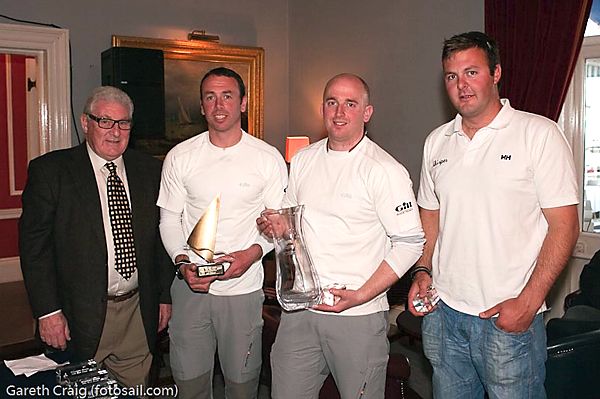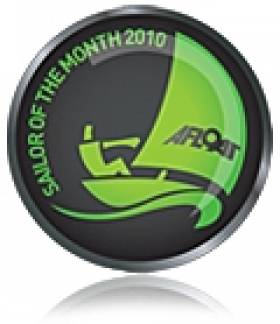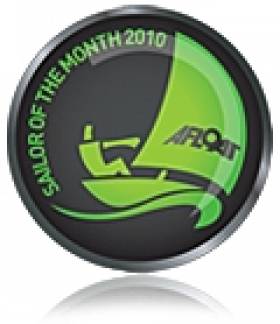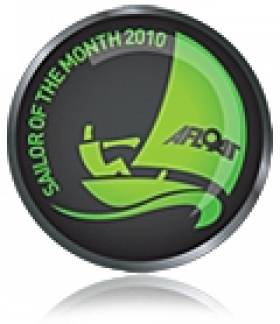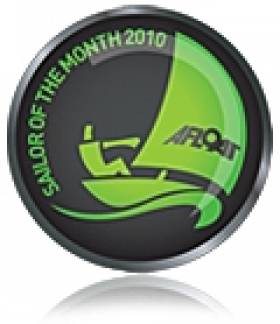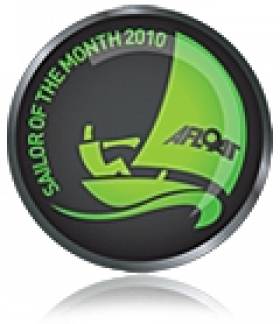Displaying items by tag: Sailor of the Month
The Commodore's Cup Team - Sailors of the Month for August
The 2010 Irish Commodore's Cup team are jointly the Afloat.ie/Irish Independent "Sailors of the Month" for August. In times past, we've had two or even three "Sailors of the Month" at once. And we even had a family – the Dicksons of Lough Ree – getting the honours together. But it's the first time that an entire team have been given the accolade.
However, the 2010 Irish Commodore's Cup team achieved their totally convincing win with a display of team spirit which was of truly international standard, and the judges acclaim the entire squad – and their enthusiastic and able management – with the accolade.
It was realized that selecting any individual sailor or one of the crews from the three boats was going to be difficult. Even when you tried to congratulate any of them, they would tend to heap praise on another of the boats. And on the rare occasion when things went wrong – as when Antix was caught by a rule break at the start of the final and clinching race – the skippers readily accepted blame.
In that instance, Antix boss and team captain Anthony O'Leary declared afterwards that he'd been "110% in the wrong". Admittedly it's not so painful saying that when you go on to sail an absolute blinder of a heavy weather race to finish second in class despite the setback of taking your penalty turn. But even so O'Leary, Dave Dwyer on marinerscove.ie, and the new boys on Roxy 6 were exemplary in their achievement.
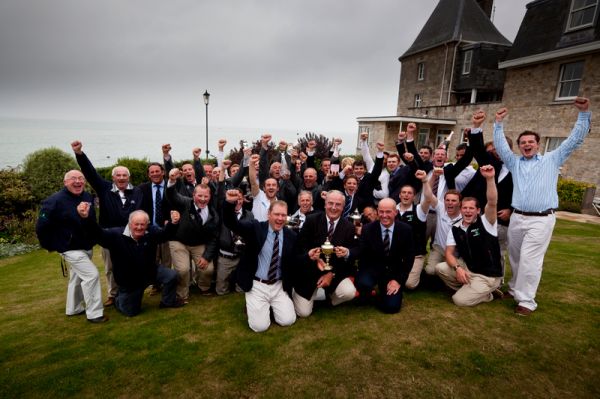
Ireland's Commodores Cup Team is August's Sailors of the Month. Photo: David Branigan
Roxy 6 was given special praise as she was still very raw, a new Corby 36 built for Rob Davis in Pembroke in Wales, and put together on the water at some speed by a Cork crew headed by Andrew Creighton, with Maurice "The Prof" O'Connell invaluable as the single permitted onboard professional.
And they sailed with the steady consistency and that sense of the bigger picture which is the key to team success. Ashore, Barry Rose of the Irish Cruiser Racing Association was always available as manager, and the result was the kind of result the Irish sailing community have dreamed about for decades. Not only have we been within a whisker of winning the Commodore's Cup in recent years, but way back in the great days of the Admirals Cup in 1979, the Irish team went into the final event of the series, the Fastnet Race, with what seemed a commanding points lead.
The notorious Fastnet storm of 1979 put paid to that. It was ironic that it was extreme Irish weather which blasted our chances. But the pain of that, and other blighted hopes, were so gloriously blown away in the Solent on Saturday August 22st as the final race was completed with Ireland's winning points piled high.
Ireland's Commodore's Cup team Crew List HERE.
Commdore's Cup Coverage HERE
Dragon Sailor Martin Byrne is July's Sailor of the Month
Martin Byrne of Dun Laoghaire is the Afloat.ie/Irish Independent "Sailor of the Month" for July with his convincing victory in the Irish Dragon Championship on Belfast Lough, a four-day event of first class racing which concluded on Sunday July 25th at Cultra.
Like so many sailing happenings which are proving successful in these stringent times, there was a distinct blast of the past about the Open Nationals 2010. The Royal North of Ireland YC at Cultra was once the leading club in the country for Dragon racing. But the creation of marinas serving Belfast Lough at Carrickfergus and Bangor meant that the pleasant waterfront club in a leafy suburb of Holywood seemed to be left behind in sailing development.
Yet the sailing waters are still there, and the people are still there too. It was local resident Simon Brien, a leading Dragon racer in Ireland and abroad, who led the movement to bring the class back to Cultra. As he has been Irish champion more than once in his 16 years in the class, Dragon sailors at home and overseas took notice. With Belfast Harbour Commission as lead sponsors, the visiting boats were craned into Belfast Docks, and the fleet of 18 top Dragons made a race of it over the four miles to Cultra where they lay out on moorings, just like the good old days.
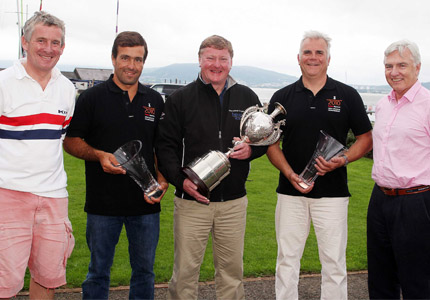
Martin Byrne, centre with trophy at the Dragon Nationals prizegiving
Crewed by longtime shipmate Adam Winklemann, and Portuguese sailmaker Pedro Andrade, Martin Byrne sailing Jaguar put his stamp on the racing from the start. In fact, the Dublin Bay boats were making hay, as Don O'Donoghue (also of Glandore) finished second overall, with Andrew Craig third. The level of racing is indicated by Klaus Diederichs, crewed by the formidable lineup of Andy Beadsworth and Jamie Lea, being back in fourth, while Simon Brien himself was in fifth, though he and his team of David Gomes and David Good took the prize for top totally amateur crew.
It was good to see the Dragons back in force where they mean a lot to sailing heritage. And it was in an area getting used to sporting success – Rory McIlroy's place is just up the road. But for now in sailing, Martin Byrne is ahead of the pack.
Dave Dwyer is 'Sailor of the Month' for June
Dave Dwyer of Cork is the Afloat.ie/Irish Independent “Sailor of the Month” for June with his convincing retention of the British Open IRC Championship over three days of racing which concluded in the Solent on Sunday June 27th.
A busy month of sailing had already produced several worthy contenders for the Sailor title. But Dwyer’s performance on the final weekend with the 39ft Marinerscove.ie (designed in 2006 by current Sailor of the Year Mark Mills of Wicklow) was in a league of its own.
The boat has of course been regularly updated and optimized during four busy years at the sharp end of national and international fleets. But even in these recessionary times, there are completely new and decidedly hot contenders coming on the scene,
Thus even as the Dwyer team – and it’s a formidable equipage - was shaping up for the Solent championship, right on Mills’ own doorstep in Wicklow it was being confirmed that the overall winner of the Round Ireland Race 2010 was the 46ft Tonnere de Breskens, designed by Jason Ker in 2008.
To add to the pain, second place went to another 2008 Ker boat, the 39ft Inis Mor (Bernard Gouy, Clifden Boat Club). In fact, there wasn’t a Mills design in the entire round Ireland fleet. But within four days, marinerscove.ie had done the business and redressed the balance against an international lineup off Cowes, clinching it with four wins on the final day of racing, and catapulting Dave Dwyer into Irish sailing’s kingpin spot for June.
More from W M Nixon on Dwyer's performance in today's Irish Independent here.
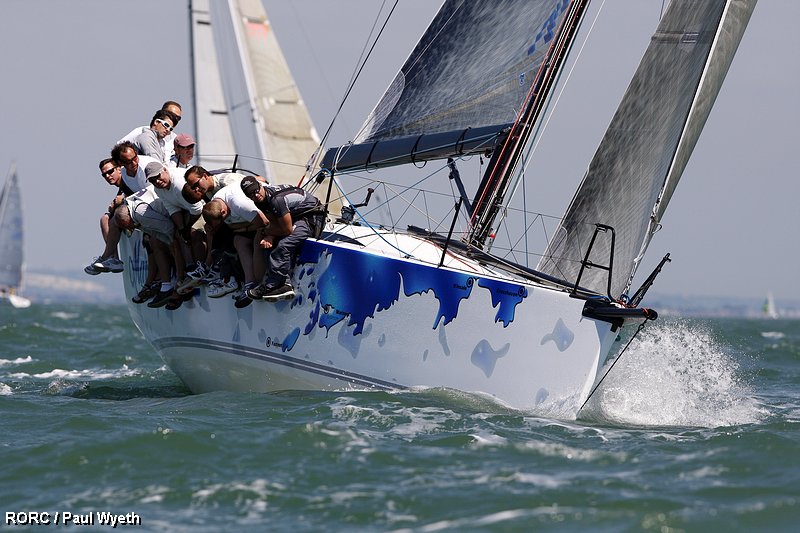
Dave Dwyer's Marinerscove in winning form on the Solent. Photo: Paul Wyeth
Sailor of the Month: Anthony O'Leary
Anthony O’Leary of Crosshaven is the Afloat.ie/Irish Independent “Sailor of the Month” for May after a steady stream of success at the very sharp end of IRC racing in Ireland and Scotland.
With his Ker 39 Antix making her debut in Irish waters, O’Leary (pictured at the wheel below by Bob Bateman) has put in an inspirational performance which will raise the hopes of the Irish Commodore’s Cup team which he’ll be leading into international competition in August.
Antix started the month by confirming her win in the Spring Series in Kinsale. She then went on to win overall in the Cork-Dun Laoghaire race on May 15th, and was on top form to clinch the class title in the Liebherr ICRA Nationals in Dublin Bay from May 21st to 23rd.
Barely pausing for breath, the boat headed on for the following extended weekend’s four-day Scottish Series in Loch Fyne. With a significant French presence to give a hint of the Commodore’s series, the racing was demanding. But the Antix crew – including Olympic son Peter – went better and better, rounding out the series with two wins on the final day. This put them firmly top of the leaderboard in the senior class, and clearly made Anthony O’Leary Ireland’s supreme sailor for May 2010.
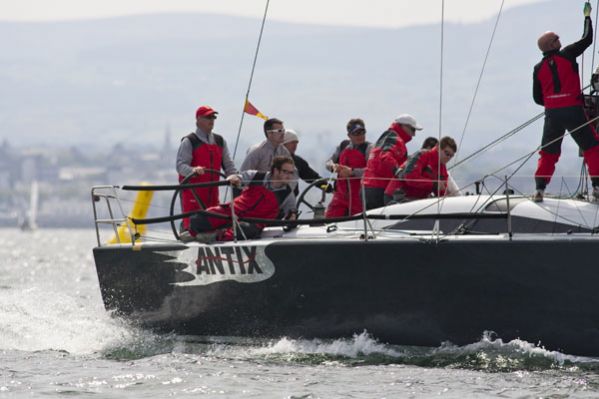
Gareth Flannigan is April's Sailor of the Month
Gareth Flannigan of Ballyholme is the Afloat.ie/Irish Independent “Sailor of the Month” for April after rising through the 43-strong fleet at last weekend’s busy East Coast SB3 Championship in Dublin Bay.
Mobility was the core concept for the 20ft SB3 as Laser International and designer Tony Castro brainstormed their way in 2002 towards a lifting-keel easily-trailed performance three-four man boat which would capture the spirit of the original iconic Laser single handed dinghy.
While there are many SB3s based in the Dublin area, nevertheless the very competitive fleet seemed to emerge from nowhere and from every corner of Ireland onto the forecourt of the Royal St George YC for this, the class’s first major event of the 2010 season.
Expat Kiwi skipper Ben Duncan, who sails from Howth, was the overnight leader and seemed securely in place. But through the second day defending title-holder Gareth Flannigan of Belast Lough implemented a strategy which saw Duncan’s points lead eroded and then bested.
With a team which included Stephen Milne who has recently launched himself onto the Olympic path with Cork’s Peter O’Leary in the Olympic Star, Flannigan cannily kept tabs on Duncan while keeping himself in the frame. His discard from Sunday’s three races was a 7th, while Duncan went down the tubes with a 19th and 18th in the two final jousts, after starting the day with a useful second.
In fact, it was Adrian O’Connell of the host club who showed best overall on Day Two, but Flannigan moved into a convincing overall lead, finishing on 15 points to the 24 of Duncan and O’Connell’s 26. It was a virtuoso performance which makes him a worthy winner of the monthly award, and it means Stephen Milne is right on line for an Oscar for best supporting actor – he has already been in lights for the second place in the Olympic Stars in Miami with Peter O’Leary in February.
Photo below: Gareth Flanningan (second fron left) and his crew received their award from Frank Keane of Mistubishi Motors. Photo: Gareth Craig More photos here.
